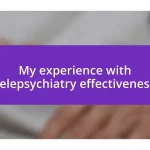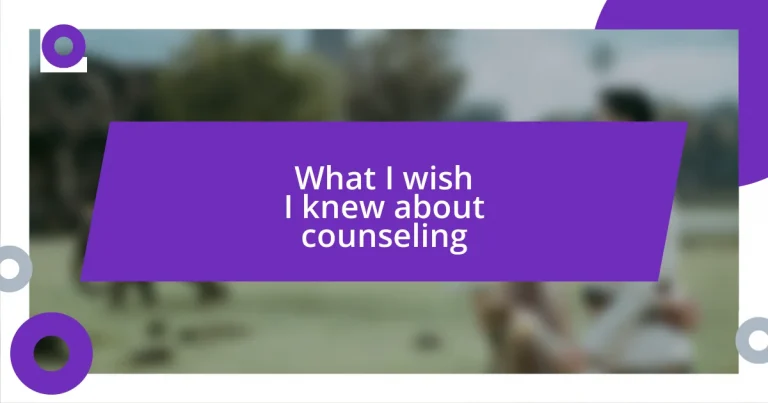Key takeaways:
- Counseling is a collaborative process focused on self-discovery, where clients are guided to explore their own solutions rather than receiving direct advice.
- Active listening and empathy are essential skills that foster trust, understanding, and deeper client engagement in the therapeutic relationship.
- Common misconceptions about counseling include the belief that it signifies weakness, solves problems, or is only for those in crisis; in reality, it can empower individuals at all stages of life and personal development.
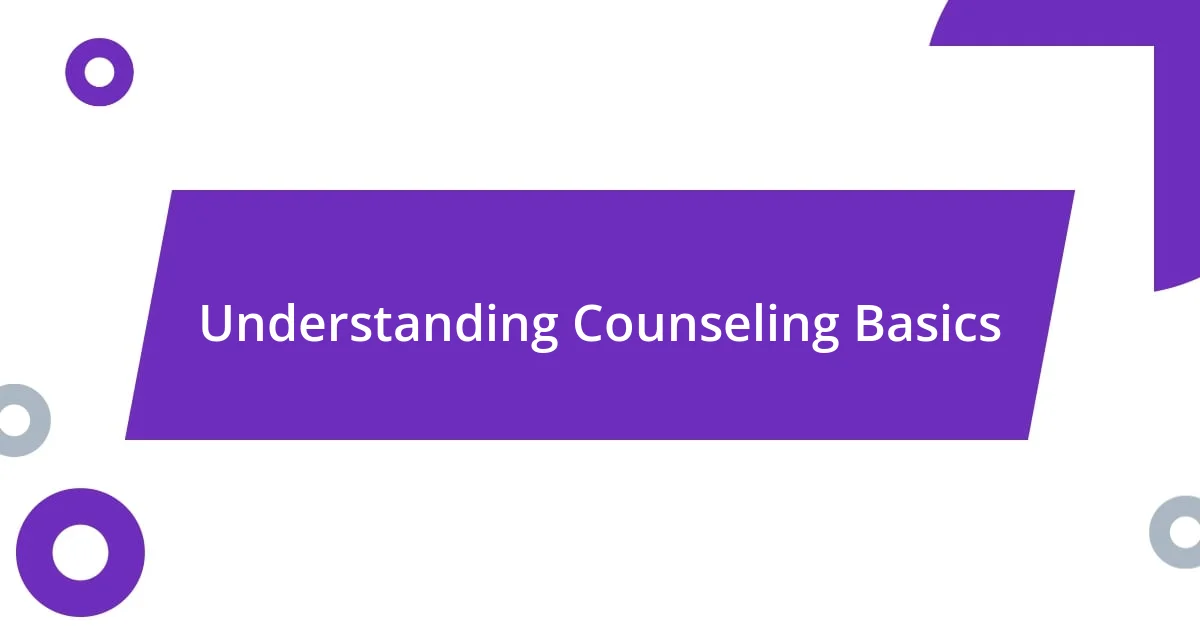
Understanding Counseling Basics
Counseling might seem like an intimidating concept at first, but it’s really just a safe space created for open communication. I remember my first session; I sat there, heart racing, but as I began to talk, I could feel the weight lifting off my shoulders. Isn’t it interesting how sharing our thoughts can bring such relief?
One essential aspect of counseling is that it’s not about giving advice but facilitating self-discovery. I learned that asking the right questions often leads clients to find their own solutions. It made me reflect: how often do we genuinely take the time to explore our inner thoughts instead of rushing to fix things?
Another fundamental point is that it’s a collaborative process. I once worked with a client who initially felt alone in their struggles. As we developed a therapeutic alliance, they realized that they weren’t isolated in their experiences. How profound is that? The feeling of being understood can transform our perspectives on life.
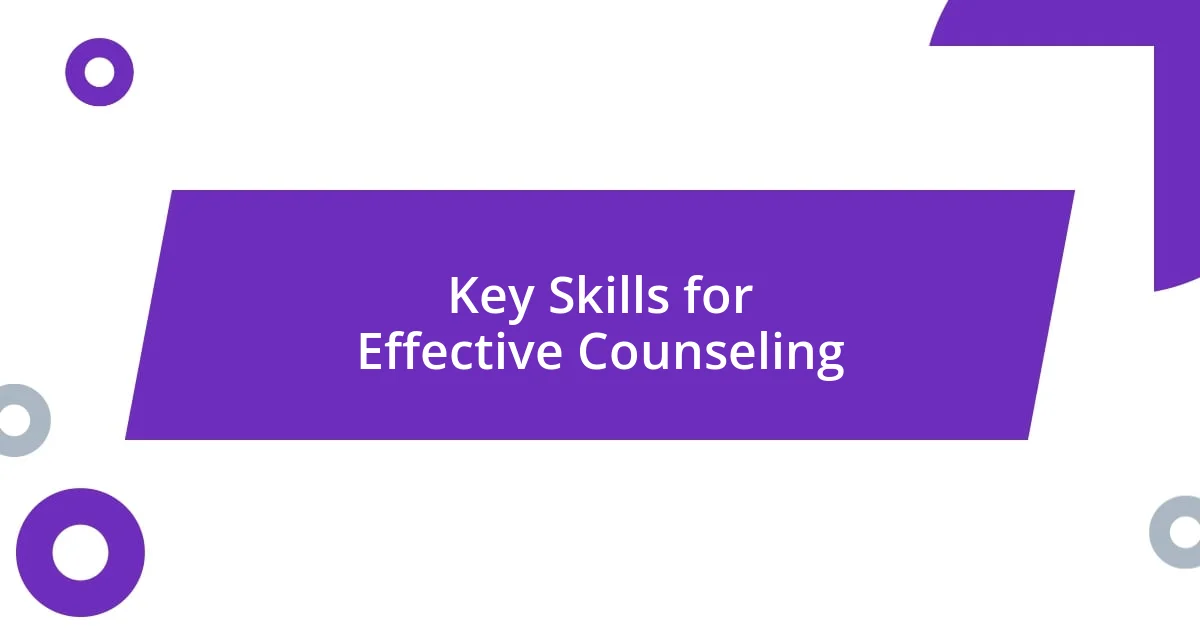
Key Skills for Effective Counseling
As I journeyed deeper into the world of counseling, I discovered that certain skills truly make a difference. Empathy stands out. It’s not just about hearing words; it’s about feeling the emotions behind them. I recall a moment when a client shared a deeply personal story. I could see their pain, and rather than just acknowledging it, I focused on understanding it. That connection not only strengthened our relationship but also encouraged them to open up even more.
Here are some key skills that can enhance effective counseling:
- Active Listening: Focusing entirely on the speaker, hearing their words, and understanding the context.
- Empathy: The ability to put yourself in someone else’s shoes and truly feel their emotions.
- Non-Verbal Communication: Being aware of body language and facial expressions to convey understanding and support.
- Questioning Techniques: Crafting open-ended questions that facilitate exploration and self-discovery.
- Cultural Competence: Understanding and respecting diverse backgrounds and perspectives.
- Patience: Allowing clients to express themselves at their own pace, creating a comfortable environment.
These skills are more than just techniques—they’re heartbeats of the counseling process, fostering deeper connections and meaningful growth.
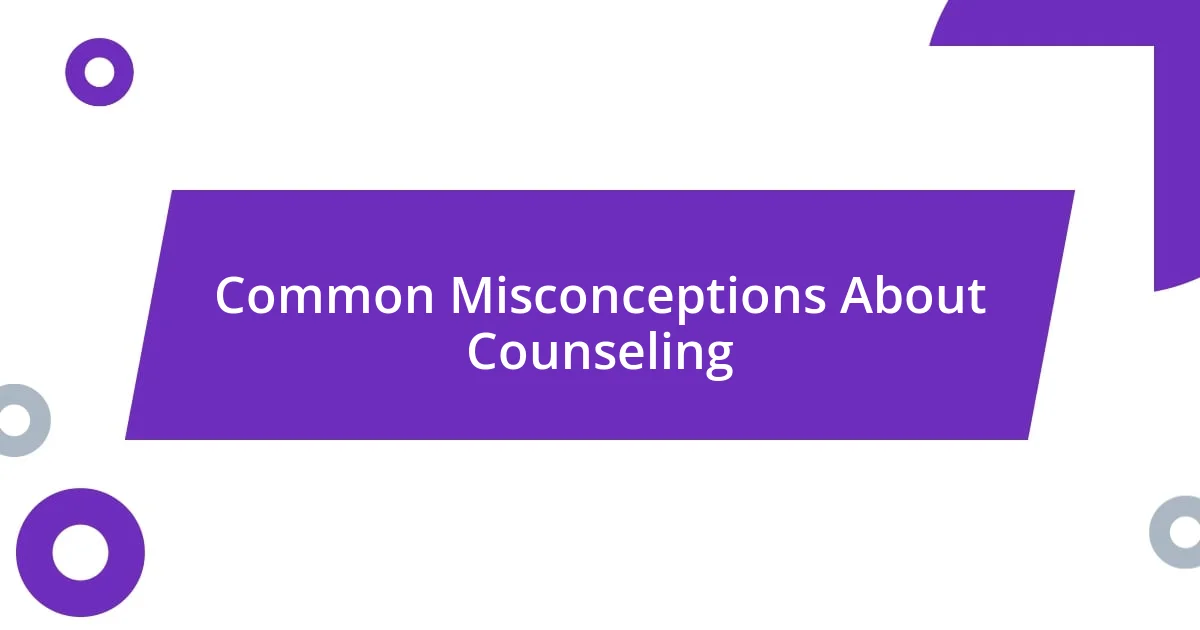
Common Misconceptions About Counseling
Common misconceptions about counseling often cloud the reality of what this process actually entails. One common myth is that seeking counseling is a sign of weakness. I remember discussing this with a friend who was hesitant to reach out for help, thinking it would make her appear vulnerable. In my experience, the courage it takes to seek assistance is actually a testament to one’s strength and resilience. Wouldn’t it be refreshing to view asking for help as a bold step toward personal growth rather than a weakness?
Another misconception involves the belief that counselors will fix all your problems. During my early days in training, I had a naive expectation that my role was to solve my clients’ issues directly. Over time, I learned that counseling is about guiding individuals to find their own answers. It feels empowering to see clients connect the dots themselves; it makes for lasting change rather than a temporary fix. Have you ever noticed how solutions stick more when we discover them on our own?
Lastly, many people think counseling is only for those in crisis. In reality, I’ve found that counseling can be immensely beneficial for anyone at any stage of life. I once had a client who sought counseling simply to enhance their personal development. This experience opened my eyes to the proactive side of therapy, where clients can work toward self-improvement, rather than just reacting to problems. Isn’t that an encouraging perspective on the value of therapy?
| Misconception | Reality |
|---|---|
| Seeking counseling is a sign of weakness | It actually demonstrates strength and courage. |
| Counselors fix your problems | Counseling facilitates self-discovery and personal growth. |
| Counseling is only for those in crisis | It’s beneficial for anyone seeking personal development. |
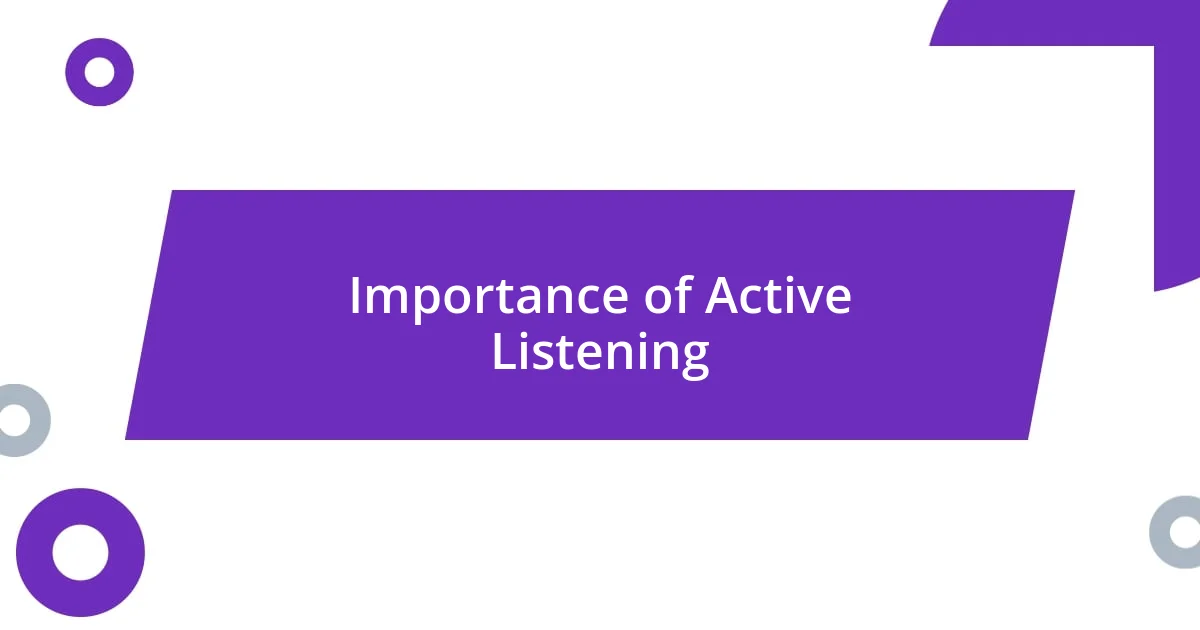
Importance of Active Listening
Active listening is a cornerstone of effective counseling, as it creates a space where clients feel genuinely heard. I remember a session where a client spoke about their struggles, and instead of thinking about my next question, I focused purely on their words and emotions. That pause allowed them to unpack layers of their experience, which brought about profound insights that we might have otherwise glossed over. Isn’t it amazing how simply being present can unlock deeper thoughts?
When we engage in active listening, we not only grasp the content of what’s being said but also the underlying feelings. In my practice, I’ve noticed that clients often express their emotions much more vividly when they feel understood. One particular session stands out: as I nodded and maintained eye contact, the client began to cry, articulating feelings they hadn’t recognized before. It’s moments like these that reveal the power of truly listening—don’t you think it can be a healing force?
Moreover, it fosters trust and safety in the counseling relationship. I reflect back on many of my clients who, after realizing I was there to listen without judgment, opened up in ways they had never anticipated. They often express gratitude for the safe environment I provided, highlighting how these interactions changed their perspectives. Isn’t that what we all want—to feel safe enough to share our innermost thoughts? Active listening not only facilitates this; it deepens the bonds that make the counseling journey truly transformative.
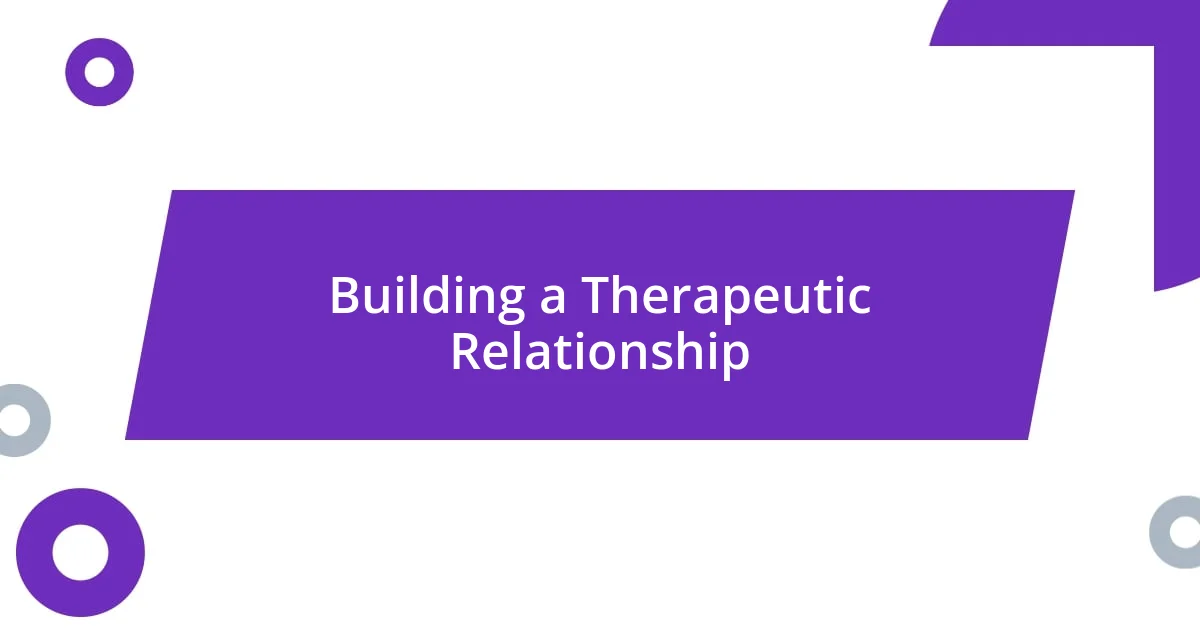
Building a Therapeutic Relationship
Building a therapeutic relationship is all about creating a sense of trust and connection. I vividly recall my early days in counseling when I met a cautious client. We started our first session with light conversation; that simple act made a huge difference. It felt like breaking ice with a long-lost friend, and I could see their shoulders drop—how valuable is it to let someone feel comfortable enough to share their story?
Trust isn’t built overnight, though. In my experience, it develops through consistent, genuine interactions over time. I once worked with a client who was initially resistant to open up. After several sessions that emphasized empathy and understanding, they began to express thoughts and feelings they previously held back. Witnessing that change was powerful; isn’t it incredible to see how vulnerability can truly lead to growth?
Establishing this relationship also invites clients to engage more deeply in their own healing. When clients see me as a partner rather than an authority figure, they’re more inclined to explore difficult topics. I often compare it to a dance: we move together, navigating the rhythm of their experiences. This collaborative approach becomes a core element of the therapeutic process—don’t you think feeling like a true team can facilitate deeper transformation?
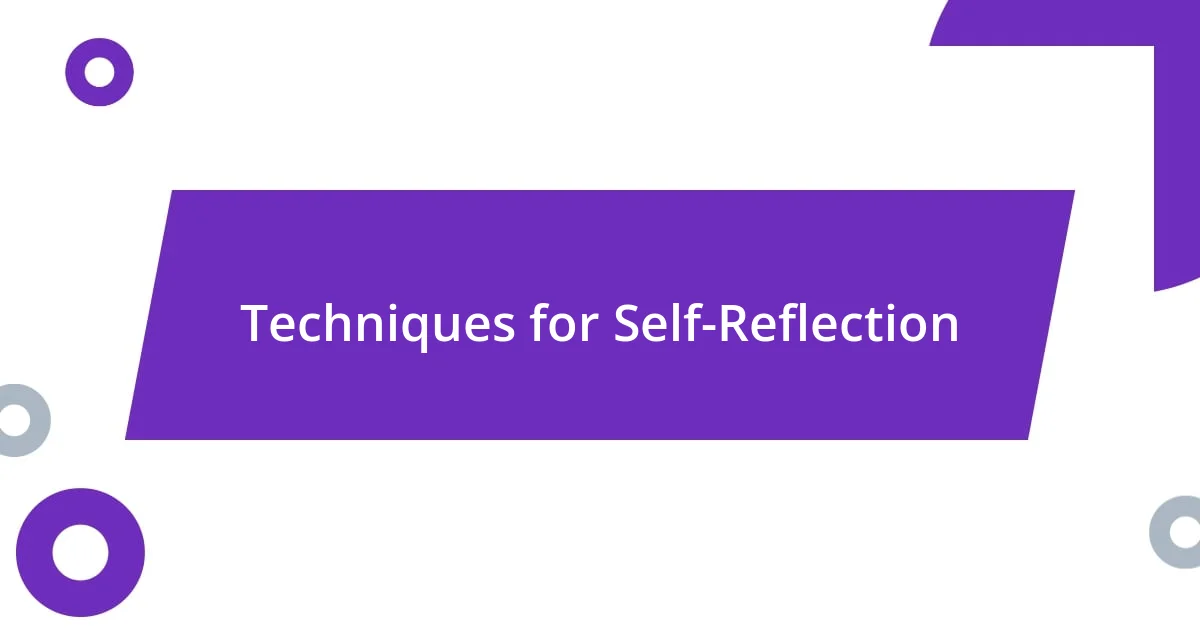
Techniques for Self-Reflection
Self-reflection techniques can significantly enhance both personal growth and client outcomes in counseling. One method I often encourage is keeping a reflective journal. I recall the transformative experience of journaling after a difficult session; putting thoughts on paper helped me sort through my feelings, and those insights fueled my next interactions with clients. Have you ever noticed how unprocessed thoughts can linger, waiting for an outlet? Writing offers that release and clarity.
Another technique that I’ve found valuable is mindfulness meditation. I’ve practiced it myself, and I’ve seen its impact on my clients. For instance, encouraging a client to take five minutes of quiet reflection before our session often leads to richer conversations. Isn’t it fascinating how a moment of stillness can open the floodgates to deeper self-awareness? It’s during these pauses that I believe we uncover the truths we might not otherwise voice.
Lastly, engaging in honest dialogue with trusted peers can uncover blind spots. In one of my supervision sessions, a colleague provided a perspective that allowed me to re-evaluate how I approached a client’s resistance. This often-shared space for vulnerability can challenge our assumptions and spark growth in ways we might not anticipate. How often do you reach out for feedback? I find that these conversations illuminate paths to self-discovery, making them invaluable in the reflective process.
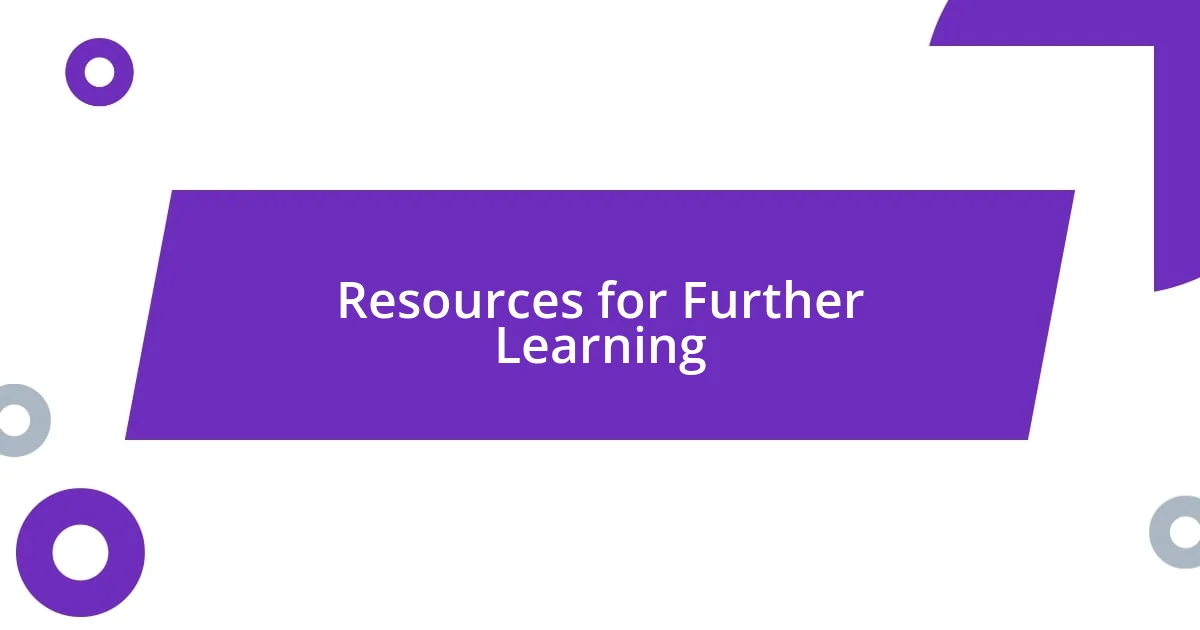
Resources for Further Learning
When it comes to further learning in counseling, I highly recommend exploring webinars and online courses. Recently, I attended a series focused on trauma-informed practices that utterly transformed my approach. It was like opening a treasure chest of knowledge—each module was packed with techniques I could begin implementing right away. Have you ever found a resource that feels perfectly timed for your practice? Those moments of discovery can spark exciting shifts in how we connect with our clients.
Books also serve as invaluable resources, particularly those written by experienced practitioners. One of my favorites is “The Gift of Imperfection” by Brené Brown. Her insights on vulnerability and courage resonated with my own journey, helping me recognize the importance of embracing imperfection—not only in myself but in my clients, too. I often ask, what if we viewed our flaws as stepping stones to deeper authenticity? Leaning into this idea has streamlined my therapeutic conversations and encouraged my clients to be more open.
Lastly, don’t underestimate the power of professional networks and communities. I became a member of a local counseling group, and the connections I’ve made have been instrumental in my growth. Just last month, during a casual coffee chat, a fellow counselor shared an innovative technique for engaging resistant clients. It’s amazing how collaboration can unveil new ways of thinking. Have you reached out to others in your field? I truly believe that sharing experiences builds a stronger foundation for our practice and fosters ongoing learning.










